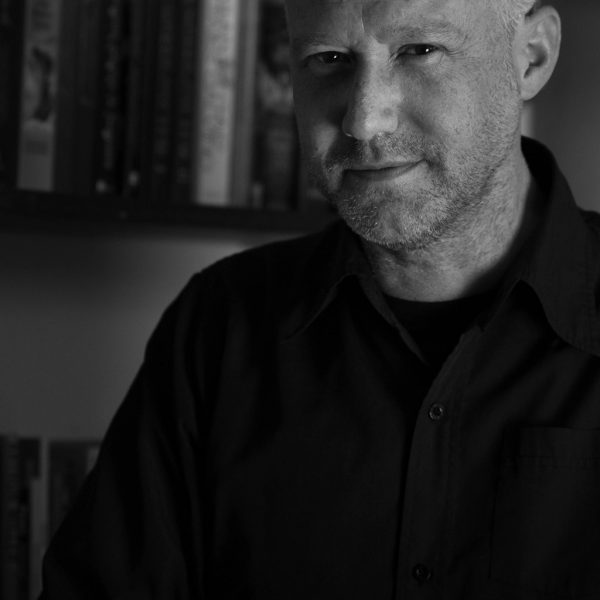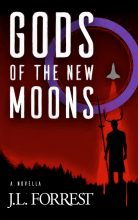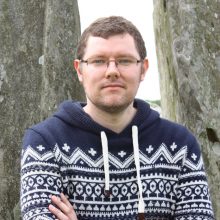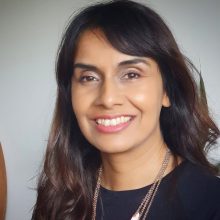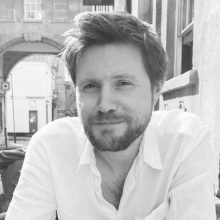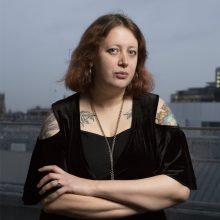Gods of the New Moons by J.L. Forrest
What led you into writing?
I’ve loved stories since I was young, and wrote constantly until college. Five years ago, I returned seriously to it.
How does a typical day look?
While I dream of “typical” days, I enjoy few of them.
My creative cycles are long, occurring over weeks and months. Think “season” instead of “day,” where story development, drafting, revision, and production may each take weeks.
An ideal day would involve at least six hours of drafting or rewriting. I believe in rewriting and, at a time when I hear a lot of indie authors downplaying its importance, I believe in it all the more.
Every day, I try to read for at least two hours. For me, reading is an important part of writing. The rest of any given day belongs to the minuscule rituals, habits, and patterns which grease the creative process. My wife has her own endeavors, too, and I afford a lot of support to them.
In some imaginary ideal, like Cicero, I’d need nothing more than my garden and my library, and each creative day might flow smoothly into the next. Alas, I haven’t found that ideal yet.
In what ways do your characters test your abilities?
About 90% of my preparation, for any project longer than a short story, focuses on character development. A book’s variety, empathy, texture, conflict, humor, and power come mostly, I believe, from characters.
In each book, I’m reaching for characters who feel fresh to me. Forget the idea of writing what you know—I write about what draws my curiosity. What characters make me curious? Those, I want to find.
Many authors experience moments when their characters run “off script.” Often a function of a writer’s id, off-script characters can either lead into interesting territory or, as likely, rob a project of its momentum and clarity. I invest so much time developing my characters that, most often, the moments when they force the narrative into a new direction cause me no angst—it’s clear why the change needs to occur—and I’ve become extremely good at plotting afresh.
Good characters make stories interesting. They’re where the gold is at.
What’s your setup?
I built a writing nook with a small desk. The desk is near the kitchen because the kitchen supplies the tea or coffee. Sometime, on days when the words flow and the writing goes into the evening, the tea becomes wine.
What lasting effects have your favourite authors had on your writing and style?
Years ago, the effects were greater. Most writers experience this. Most, I’m sure, begin by emulating their favorite authors. At first, this is healthy, and honestly I wish more blossoming writers would read more challenging texts, understand why those texts are good, and attempt to write to that level.
For a time I found myself influenced equally by economical, lean, sparse prose and by embellished, flowery, purple prose. Mostly I reach for the spare language, viz.: E.B. White, George Orwell, Stephen King, C.J. Cherryh, Elmore Leonard, Erica Jong. Grandiloquent writing has its place, though.
Over time, I’ve adopted so many tricks, styles, voices, techniques, and approaches that I can honestly say my writing as become something unto itself. I write what the narrative requires.
What do you do for inspiration?
Read. Be curious. Get out into the world. When I can, I travel.
At least half my reading is non-fiction. I study philosophy, science, sociology, design, art, and music. The world is big, fascinating, and endlessly inspirational.
What repeating themes do you find yourself pulling into your stories?
Themes of identity, misunderstanding the Other, sexuality, agency, and consciousness always appear in my work, though they’re not always obvious. The conflict between the Machine and Nature often takes center stage. As a whole, I try in my stories to show both the worst and best of humanity.
How do you wind down?
I play guitar and mandolin. I hike and spend time in nature, and nature is a theme which looms large in my storytelling. I love a good art opening or exhibition.
What sort of challenges do you regularly overcome while world-building?
The only consistent challenge in world-building, for me, is riding the fine line between verisimilitude and entertainment. Too much complexity, even intelligent complexity, drags the story down; too little fails to capture the reader. I usually overshoot the mark and need to cut unnecessary elements.
What’s the most useful advice you could give to an aspiring author?
Read. Read a shit ton. Read broadly in both fiction and non-fiction. Learn to read critically.
Study others’ writing to learn what makes stories work, what makes excellent style, and why what’s good for one reader is terrible for another. Most aspiring writers have, in my opinion, come nowhere near the level of reading required to do a service to their own craft, to the tradition of writing, and to readers.
Tell us about the book you’re promoting.
GODS OF THE NEW MOONS.
It’s the sequel to WHEN THE WORLD ENDS, and the second long novella in a series called Songs at the End of the World. These are tales of dark fantasy set in a near future after the collapse of global society. Several readers have drawn comparisons between Songs at the End of the World and Stephen King’s THE STAND, if the villains in THE STAND had nanotechnology, orbital space stations, and bioweapons.
I’m producing these as a series of five 40,000-word novellas. Each book also pairs with a piece of music composed and recorded by the musician King Makis.
👋 Hi! I run Author Interviews
As a new writer I found myself itching to contribute to a thriving, creative community, so I made Author Interviews and I've met loads of wonderful people in the process. You can buy my debut fantasy RINGLANDER: THE PATH AND THE WAY from Amazon.
